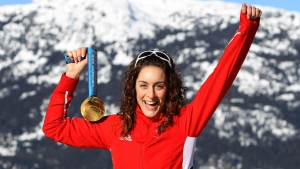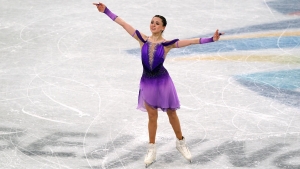Few sporting events can boast such unrelenting drama and consistent controversy as the Winter Olympics, which celebrates its 100th anniversary on Thursday.
From fearless bobsleigh pilots to sequined ice queens, cool-headed curlers and thrill-seeking snowboarders, the Games and its stars have chiselled their own unique place in the world’s sporting calendar.
Here, the PA news agency’s Olympic correspondent Mark Staniforth picks out eight of his favourite moments from the six Winter Olympics he has covered, starting with Salt Lake City in 2002.
Steven Bradbury, 2002
Bradbury’s claimed Australia’s first Winter Olympic gold medal in tumultuous fashion when all four of his rivals in the men’s 1,000m short-track final crashed out on the final corner. Veteran Bradbury, competing in his fourth Games and almost half a lap behind at the time of the incident, duly picked his way through the wreckage. “Oh my God,” Bradbury recalled thinking as he crossed the line, “I think I just won.”
Rhona Martin, 2002
Martin led her self-styled squad of east Ayrshire housewives into the Olympic curling final against all the odds, having languished on the brink of elimination in the heats. Cue messages from prime ministers and a curling-frenzied nation agog into the early hours as Martin delivered her famous ‘Stone of Destiny’, sealing a dramatic win over Switzerland and writing her name into British sporting folklore.
Lindsey Jacobellis, 2006
As if to emphasise the anarchic spirit of snowboard-cross, included in the Olympic programme for the first time in Turin, American favourite Jacobellis attempted a completely unnecessary trick off her final jump and fell, handing gold to Switzerland’s Tanja Frieden. In a (very) belated twist, Jacobellis would finally make up for her missed opportunity by winning gold in the same event in Beijing in 2018.
Kim Yu-na, 2010
Shimmering in a dress of cobalt blue, the brilliant South Korean figure skater lit up the Pacific Coliseum with a mesmerising and world record-breaking free skate. Kim’s performance, which earned a still unbeaten total score of 228.56, capped another dramatic and emotional women’s singles event, in which home favourite Jeannie Rochette took bronze, despite being told of the death of her mother within days of arriving in Vancouver.
Amy Williams, 2010
Just a week after the tragic death of Georgian luger Nodar Kumaritashvili in a training accident, skeleton racer Amy Williams tamed the notorious Whistler track to become Britain’s first individual Winter Olympic gold medallist in 30 years. The unfancied Williams set a new track record during four dominant runs which saw her sweep away the rest of the field by a cumulative total of over half a second. “Speed is my friend”, grinned Williams afterwards.
Lizzy Yarnold, 2014
Britain’s improbable dominance of the Olympic skeleton discipline continued in Sochi in 2014 as Lizzy Yarnold built on a dominant World Cup season to emulate her since-retired compatriot Williams and win Winter Olympic gold. Yarnold went on to overcome a series of health problems and successfully defend her crown in Pyeongchang in 2018, when she was joined by team-mate Laura Deas on the podium.
Billy Morgan, 2018
Four years earlier in Sochi, Morgan had drowned the memory of a disappointing 10th place finish in the men’s snowboard slopestyle competition by indulging in apres-ski with a toilet seat hanging round his neck. Four years later, against all conceivable odds, he turned the toilet seat into an Olympic bronze medal, courtesy of one brilliant final jump in the inaugural men’s big air competition.
Figure skating, 2022
A 15-year-old delivering an unforgettable short program routine then floundering in front of the eyes of the world; a team-mate landing quads for fun then storming off dissatisfied with silver, vowing never to skate again but returning three days later in the post-Games gala dressed as Wonder Woman; Nathan Chen’s skate-perfect rendition of Elton John’s ‘Rocket Man’: the figure skating competition in Beijing set fire to an otherwise grim and Covid-stricken Games, and created a controversy that continues to burn.





























